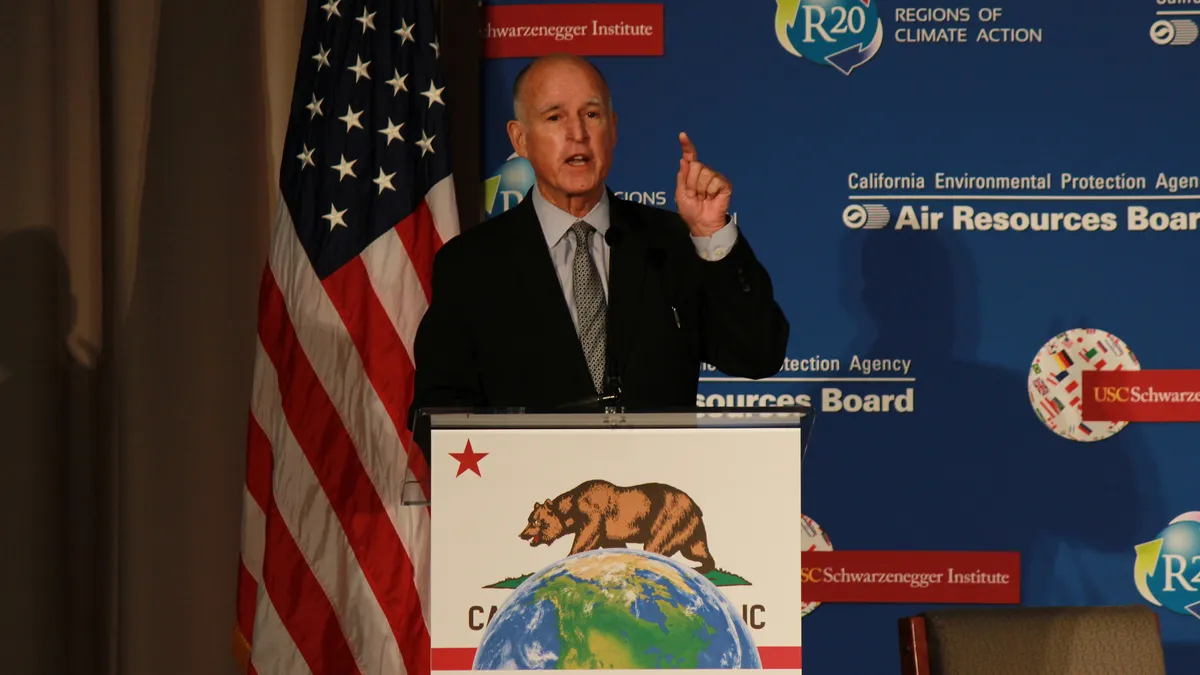Dive Brief:
-
Former California Gov. Jerry Brown, D, defended his state's fuel efficiency standards to the House Committee on Oversight and Government Reform Tuesday, following the decision by three major automakers to side with the Trump administration's proposal to prevent states from creating more stringent standards than the federal government.
-
"The California standard is the world standard … The Trump standard is a deviant standard, a minority standard and a standard that cannot stand," he said. "One way or the other, Detroit will shape up, if only because in five years we're going to be buying Chinese cars because Detroit is just producing gas-guzzlers that nobody wants. And that would be a tragedy."
- General Motors, Toyota and Fiat Chrysler on Monday announced they would support the Trump administration alongside the Association of Global Automakers in an ongoing lawsuit against the U.S. Department of Transportation. "General Motors better wake up or they're going to lose," said Brown.
Dive Insight:
The Trump administration's efforts to prevent California from enforcing implementing its own fuel standards is a national threat to the electric vehicle market, say EV advocates. Some 15 states, representing almost 40% of the automobile industry, have adopted California's standard, which also provides a waiver from the Environmental Protection Agency that states rely on in part to provide zero emissions vehicle rebates.
"The California waiver is important. It means California can set higher standards. It means California can be a laboratory of energy innovation, and that's exactly what we've done," said Brown.
Ford, Honda, BMW and Volkswagen in July struck a deal with California that loosened the emissions standard for those four companies, while awarding them additional EV credits to meet those standards. As a result, automakers agreed to cooperate with those emissions benchmarks.
But the president, reportedly incensed by that deal, announced in September he would be revoking California's ability to implement its own standards, and his Department of Transportation shortly after filed a proposal to act on his directive.
Now, GM, Toyota and Chrysler have said they will side with Trump in the subsequent lawsuit filed by a number of environmental and clean energy groups. The automobile group, dubbed The Coalition for Sustainable Automotive Regulation, says the ultimate goal is to set a unified national standard, and that they expect the number of automakers under the coalition to grow.
"The decision to intervene in the lawsuit is about how the standard should be applied, not what the standard should be," John Bozzella, president and CEO of Global Automakers and Coalition spokesperson said in a statement. "With our industry facing the possibility of multiple, overlapping and inconsistent standards that drive up costs and penalize consumers, we had an obligation to intervene."
But Brown, during Tuesday's hearing, vocalized his fear that allowing the Trump standard to prevail could severely cut the U.S. share of the EV market, allowing other countries in Asia and Europe to jump ahead in the clean transportation sector.
"We've seen this before. If Detroit wants to ignore the rest of the world, they will ignore market share," he said, comparing innovative clean vehicle programs in other countries to the rise of photovoltaic manufacturing across Asia.
"We know what happened in the solar sector, photovoltaics. … The Chinese are going to have 85% of the car industry if Trump and the auto industry get their way."














